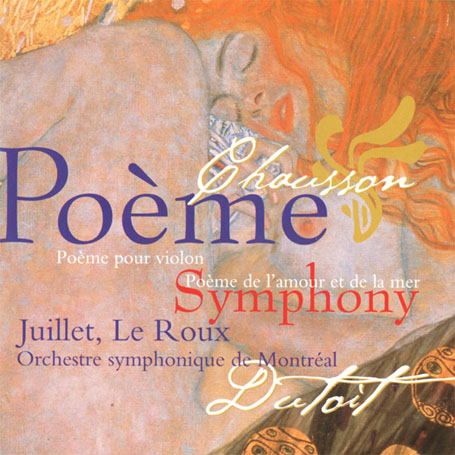Chausson Poème; Symphony Op.20 etc
Variable success in three fine [piece] pieces from the late 19th-century French orchestral repertoire
View record and artist detailsRecord and Artist Details
Composer or Director: (Amedée-)Ernest Chausson
Label: Decca
Magazine Review Date: 7/2000
Media Format: CD or Download
Media Runtime: 77
Catalogue Number: 458 010-2DH

Tracks:
| Composition | Artist Credit |
|---|---|
| Symphony |
(Amedée-)Ernest Chausson, Composer
(Amedée-)Ernest Chausson, Composer Charles Dutoit, Conductor Montreal Symphony Orchestra |
| Poème de l'amour et de la mer |
(Amedée-)Ernest Chausson, Composer
(Amedée-)Ernest Chausson, Composer Charles Dutoit, Conductor François Le Roux, Baritone Montreal Symphony Orchestra |
| Poème |
(Amedée-)Ernest Chausson, Composer
(Amedée-)Ernest Chausson, Composer Chantal Juillet, Violin Charles Dutoit, Conductor Montreal Symphony Orchestra |
Author: rnichols
In performing Chausson’s music, texture is often a problem. As a pupil of Franck and an admirer of Wagner he was always wary of anything too facile, and Debussy upbraided him with being too concerned with the inner parts and not allowing his natural lyricism to flourish unencumbered.
The balance engineers for this disc have rather toned down the violins, especially in the Symphony, where they don’t sing out quite as persuasively as in Ansermet’s late recording with the Suisse Romande (Decca, 1/68 – nla). As a result we hear rather too much of the inner parts, making the work sound a touch stodgy. Also, Dutoit ignores most of Chausson’s little local tempo variations, which I imagine were designed to lend a certain flexibility to this exercise in fin de siecle seriosity.
Balance in the Poeme for violin and orchestra is excellent. Other violinists, to match the tragical/magical Turgenev story which underlies the piece, have been tempted to play it wild and gipsified, and for some tastes Chantal Juillet’s playing may be slightly too clean (sweeping does not in general include swooping), but she phrases eloquently and the trickier bits of double- stopping are well in tune.
Balance problems recur in thePoeme de l’amour et de la mer. It seems clear, from the performances that took place in Chausson’s lifetime, that he sanctioned both female and male interpreters of the voice part. But subsequently it has been the preserve of sopranos, and I’m afraid this performance shows why: Le Roux is fighting for much of the time against Chausson’s luxuriant orchestration. Too often the orchestration wins, and his heroic efforts are made at the expense of vocal beauty and therefore of the autumnal nostalgia that should infuse this fine piece.'
The balance engineers for this disc have rather toned down the violins, especially in the Symphony, where they don’t sing out quite as persuasively as in Ansermet’s late recording with the Suisse Romande (Decca, 1/68 – nla). As a result we hear rather too much of the inner parts, making the work sound a touch stodgy. Also, Dutoit ignores most of Chausson’s little local tempo variations, which I imagine were designed to lend a certain flexibility to this exercise in fin de siecle seriosity.
Balance in the Poeme for violin and orchestra is excellent. Other violinists, to match the tragical/magical Turgenev story which underlies the piece, have been tempted to play it wild and gipsified, and for some tastes Chantal Juillet’s playing may be slightly too clean (sweeping does not in general include swooping), but she phrases eloquently and the trickier bits of double- stopping are well in tune.
Balance problems recur in the
Discover the world's largest classical music catalogue with Presto Music.

Gramophone Digital Club
- Digital Edition
- Digital Archive
- Reviews Database
- Full website access
From £8.75 / month
Subscribe
Gramophone Full Club
- Print Edition
- Digital Edition
- Digital Archive
- Reviews Database
- Full website access
From £11.00 / month
Subscribe
If you are a library, university or other organisation that would be interested in an institutional subscription to Gramophone please click here for further information.




